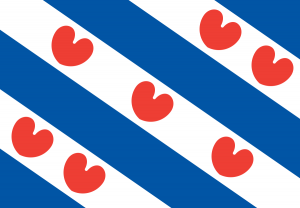Language/Western-frisian/Grammar/Negation
Hi Western Frisian learners! 😊
In this lesson, we will learn about negation in Western Frisian. We will explore how to make a sentence negative and work with common negative words. Remember that learning a language is easier when you enjoy it, so we will add cultural and interesting facts to the lesson. Don't hesitate to find native speakers on Polyglot Club and ask them any questions.
If you want to review Western Frisian Grammar, you can visit the Grammar page.
Let's start with
Negative Words[edit | edit source]
In Western Frisian, there are several negative words that we can use to make a sentence negative. Here are some of the most common ones:
| Western Frisian | Pronunciation | English |
|---|---|---|
| nee | [neː] | no |
| net/ gjin | [nɛt/ ɣin] | not/ none |
| ne... net | [nə nɛt] | not... any |
| nea | [neːja] | never |
Let's put them in context.
Dialogue:
- Person 1: Woest do tee? (Do you want tea?)
- Person 2: Nee, ik wol kofje. (No, I want coffee.)
In the dialogue above, we use "nee" to answer negatively to a question. Now, let's see how to use "net/ gjin" and "ne... net" in a sentence.
Dialogue:
- Person 1: Ha jo in hûn? (Do you have a dog?)
- Person 2: Nee, ik ha gjin hûn. (No, I don't have a dog.)
In the dialogue above, we use "gjin" to say "none". We can also use "ne... net" to say "not any".
Dialogue:
- Person 1: Ha jo in kat of in hûn? (Do you have a cat or a dog?)
- Person 2: Nee, ik ha nea in kat of in hûn hân. (No, I have never had a cat or a dog.)
In the dialogue above, we use "nea" to say "never".
Negation in Sentences[edit | edit source]
In Western Frisian, we can make a sentence negative by adding "net" or "net mear" (no longer) to it. Here are some examples:
| Affirmative Sentences | Negative Sentences |
|---|---|
| Ik bin bliid. (I am happy.) | Ik bin net bliid. (I am not happy.) |
| Wy geane nei it strân. (We are going to the beach.) | Wy geane net mear nei it strân. (We are no longer going to the beach.) |
| Sy hat in hûn. (She has a dog.) | Sy hat gjin hûn. (She doesn't have a dog.) |
We can also use "ne" before the verb to make the sentence negative, but this is less common in spoken language.
| Affirmative Sentences | Negative Sentences |
|---|---|
| Ik wurkje hjoed thús. (I work from home today.) | Ik wurkje hjoed net thús. (I don't work from home today.) |
| Wy fytse nei it park. (We bike to the park.) | Wy fytse net nei it park. (We don't bike to the park.) |
| Sy sjongt in liet. (She sings a song.) | Sy sjongt net in liet. (She doesn't sing a song.) |
Notice that in negation sentences, the word order is the same as in affirmative sentences.
Cultural Insight[edit | edit source]
Negation is an important part of language, but it also has a cultural aspect. In Western Frisian, the culture is known for its emphasis on directness and honesty. This is reflected in the use of negation, where people tend to be more direct and explicit about what they mean. For example, Western Frisian people might say "Ik wol net mei dy prate" (I don't want to talk to you) instead of "Ik kin no net prate" (I cannot talk now), which would be less direct.
Conclusion[edit | edit source]
In this lesson, we learned about negation in Western Frisian. We explored how to use negative words and how to make a sentence negative. We also learned about the cultural aspect of negation and how it reflects Western Frisian people's directness and honesty. Keep practicing Western Frisian and try to make sentences negative on your own. Remember that you can always practice with native speakers on Polyglot Club.
➡ If you have any questions, please ask them in the comments section below.
➡ Feel free to edit this wiki page if you think it can be improved. 😎
Sources[edit | edit source]
With this lesson finished, you may want to explore these additional pages: Give your Opinion, Say Hello and Greetings in Western Frisian, Plurals & Pronouns.

